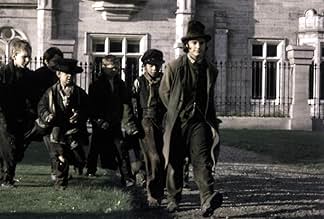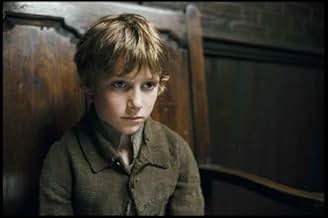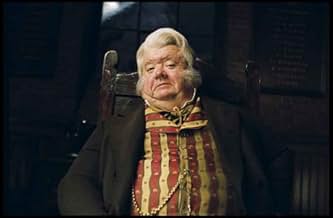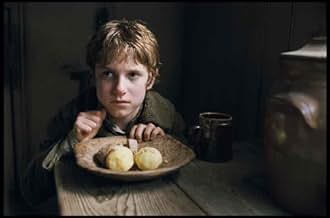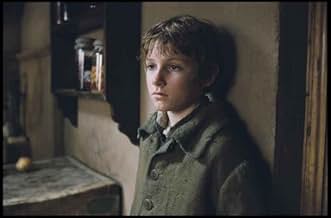Oliver Twist
- 2005
- Tous publics
- 2h 10min
NOTE IMDb
6,8/10
35 k
MA NOTE
Adaptation du conte classique de Dickens, où un orphelin fait la connaissance d'un pickpocket dans les rues de Londres. De là, il rejoint un foyer de garçons formés à voler pour le compte de... Tout lireAdaptation du conte classique de Dickens, où un orphelin fait la connaissance d'un pickpocket dans les rues de Londres. De là, il rejoint un foyer de garçons formés à voler pour le compte de leur maître.Adaptation du conte classique de Dickens, où un orphelin fait la connaissance d'un pickpocket dans les rues de Londres. De là, il rejoint un foyer de garçons formés à voler pour le compte de leur maître.
- Réalisation
- Scénario
- Casting principal
- Récompenses
- 2 victoires et 4 nominations au total
Joe Tremain
- Hungry Boy
- (as Joseph Tremain)
Avis à la une
I completely disagree with the comment I just read. I thought Roman Polanski did great respects to the story and to Dickens. I thought all of the performances were well done and Ben Kingsley was just amazing. I have been in the production of Oliver! the musical three times and have read the book about a million times. It is one of my all time favorite stories and plays and I have been disappointed with the past Oliver Twist films. I remember a few years ago I saw a very poorly done Oliver Twist with Elijah Wood as the Artful Dodger. This one did not disappoint me as a huge fan in the least. I feel Roman Polanski really understood what Dickens was trying to express in his books. And by the way, the character Oliver is supposed to faint, it is a sign of his weakness. I know I am repeating myself but I really did love the performances. The Artful Dodger was great and Mr.Salsbury was done so justly. Even the smallest characters were performed amazingly. I think the only way someone would foolishly call this off as a poorly written, poorly acted, or poorly done film was if they were blind and deaf! No offense to anyone who is of course, but I was very taken aback, as I said, by the comment I just read about this film. The only thing it has against it is that it's a bit long. I knew where the story was going at every moment but for someone just being introduced to Oliver Twist, it might seem to go on for a while. But if you look back at the history of movies, many of the best films are long. If you are a fan of Charles Dickens, please see this film - you will love it. If you are a fan of Roman Polanski it is one of his best! If you wish to be entertained in a very classic and non-offensive way, please see this film. I just loved it and could go on and on. This is a story and film for all ages!
There was little that Charles Dickens didn't know about human nature. Who better to interpret his work for the screen than the similarly gifted Roman Polanski.
Polanski's film allows everyone their humanity. Even the extras who people the immaculately designed sets, seem to have a life outside of this film. Ben Kingsley's performance as Fagin is not held in aspic in old age, but is full of hints about his earlier life. Oliver's sufferings seem to mirror that of children in many places and in all times. When it is alleviated it is not by those worldly motivations of charity or civil duty. While a carriage full of prosperous people studiously ignore his plight, a poor old woman who has little herself cares for him. While the wealthy city is content for him to die on the street, a criminal feeds him. When Oliver finally takes his place in the middle class, a priggish religiosity reminds us of Victorian society's cure for criminality. In the end Polanski knows and Dickens asserts that individual decency and humanity alone provide hope.
Polanski's film allows everyone their humanity. Even the extras who people the immaculately designed sets, seem to have a life outside of this film. Ben Kingsley's performance as Fagin is not held in aspic in old age, but is full of hints about his earlier life. Oliver's sufferings seem to mirror that of children in many places and in all times. When it is alleviated it is not by those worldly motivations of charity or civil duty. While a carriage full of prosperous people studiously ignore his plight, a poor old woman who has little herself cares for him. While the wealthy city is content for him to die on the street, a criminal feeds him. When Oliver finally takes his place in the middle class, a priggish religiosity reminds us of Victorian society's cure for criminality. In the end Polanski knows and Dickens asserts that individual decency and humanity alone provide hope.
Adapted from the classic Dickens tale, Oliver Twist is the story of an idealistic orphan struggling to survive in a savage adult world. A world where hypocrisy, greed and cunning are celebrated and there are only rare glimpses of compassion.
The film focuses on the key events of the Dickens novel, excluding many of the subplots and associated characters. It opens with Oliver's (Barney Clark) arrival at the workhouse of "Please Sir, can I have some more" fame and follows his escape to London and its dingy underworld. Here he falls in with a band of pickpockets led by Fagin (Ben Kingsley) - a central character typifying hypocrisy, greed and cunning - but finds salvation in the form of Mr Brownlow (Edward Hardwicke) who recognizes the goodness in Oliver and endeavors to extract him from his, albeit unsuccessful, life of thievery.
As he did with his award-winning, "The Pianist", Polanksi drew on his own life experiences as an orphan in the ghettos in World War II to recreate certain moods. Grim, grimy and often claustrophobic, "Oliver Twist" startlingly depicts a callous world where children live at the whim of ruthless, self-serving adults. But the horror of this dark, unforgiving world is relieved by the inclusion of humour and banter throughout, making the film both captivating and entertaining.
As Oliver, Barney Clark exemplifies the helplessness of an innocent at the mercy of strangers and being manipulated for their benefit. As noted by Mr Sowerberry, the undertaker, "There's an expression of melancholy in his face, my dear, which is very interesting. He'd make a delightful mute". And mute and incapacitated - be it through hunger, illness, injury and/or fear - he is for much of the film. Other than a surprising brief show of defiance that takes him from the coal shed and sets him on the road to London, there is little evidence of any determination, strength or willfulness at all in this Oliver. But unfortunately there is little to endear him either and the film suffers for it.
Harry Eden has more depth and is much more compelling as the Artful Dodger. Plucky and likable, his struggle with the consequences of his betrayal of Nancy (Leanne Rowe) is agonising. Ben Kingsley is masterful and almost unrecognizable as Fagin. Depicted as pure evil in the novel, Polanksi strives to give this character humanity and meaning. The result is a foul, exploitative, groveling survivor a desperate and pitiful villain, but not a completely heartless one.
The elimination of many of the twists of the novel means that this film may disappoint viewers familiar with the intriguing undercurrents of Dickens' plot and richness of his characters' and their relationships. The only incredible discovery that Oliver makes in this version is that there is a better life to either the workhouse or the den of thieves.
While adaptation to film necessitates simplification of the story and as Polanksi points out "For today's taste, you need to abandon a certain amount of melodrama that was very typical for the period", it is easy to feel that in this paring down we have been left with an entertaining adventure set in 19th century Britain. When it comes to this Oliver, less is not more.
The film focuses on the key events of the Dickens novel, excluding many of the subplots and associated characters. It opens with Oliver's (Barney Clark) arrival at the workhouse of "Please Sir, can I have some more" fame and follows his escape to London and its dingy underworld. Here he falls in with a band of pickpockets led by Fagin (Ben Kingsley) - a central character typifying hypocrisy, greed and cunning - but finds salvation in the form of Mr Brownlow (Edward Hardwicke) who recognizes the goodness in Oliver and endeavors to extract him from his, albeit unsuccessful, life of thievery.
As he did with his award-winning, "The Pianist", Polanksi drew on his own life experiences as an orphan in the ghettos in World War II to recreate certain moods. Grim, grimy and often claustrophobic, "Oliver Twist" startlingly depicts a callous world where children live at the whim of ruthless, self-serving adults. But the horror of this dark, unforgiving world is relieved by the inclusion of humour and banter throughout, making the film both captivating and entertaining.
As Oliver, Barney Clark exemplifies the helplessness of an innocent at the mercy of strangers and being manipulated for their benefit. As noted by Mr Sowerberry, the undertaker, "There's an expression of melancholy in his face, my dear, which is very interesting. He'd make a delightful mute". And mute and incapacitated - be it through hunger, illness, injury and/or fear - he is for much of the film. Other than a surprising brief show of defiance that takes him from the coal shed and sets him on the road to London, there is little evidence of any determination, strength or willfulness at all in this Oliver. But unfortunately there is little to endear him either and the film suffers for it.
Harry Eden has more depth and is much more compelling as the Artful Dodger. Plucky and likable, his struggle with the consequences of his betrayal of Nancy (Leanne Rowe) is agonising. Ben Kingsley is masterful and almost unrecognizable as Fagin. Depicted as pure evil in the novel, Polanksi strives to give this character humanity and meaning. The result is a foul, exploitative, groveling survivor a desperate and pitiful villain, but not a completely heartless one.
The elimination of many of the twists of the novel means that this film may disappoint viewers familiar with the intriguing undercurrents of Dickens' plot and richness of his characters' and their relationships. The only incredible discovery that Oliver makes in this version is that there is a better life to either the workhouse or the den of thieves.
While adaptation to film necessitates simplification of the story and as Polanksi points out "For today's taste, you need to abandon a certain amount of melodrama that was very typical for the period", it is easy to feel that in this paring down we have been left with an entertaining adventure set in 19th century Britain. When it comes to this Oliver, less is not more.
Polanski is the kid of guy who likes to dance on the edge. A mixture of clown, genius and artist who has suffered personal tragedy and humiliation but one who keeps cranking amazing films. This Oliver Twist is no exception. Polanski has reworked the story and taken out the 19th century coincidences, e.g., the highly improbable fact that Oliver is Brownlow's grandson and the business with the portrait of Oliver's mother, given the old tale a fresh coat of paint with new amazing character actors such as Leanne Rowe, a young and thoroughly charming Nancy, Henry Eden, a scamp of a Dodger, Jamie Forman, a repulsive Bill Sykes with no redeeming features whatsoever and the veteran Edward Hardwicke as Brownlow. But, it's young Barney Clark who steals the show. In past versions, Oliver is merely a device upon which the other array of characters are hung. We'll all remember Sir Alec Guinness, Richard Dreyfus and Ron Moody's Fagin, Oliver Reed and Robert Newton's Bill Syke, Elijah Wood, Anthony Newley and Jack Wild's Dodger but who were the Olivers? We will remember young Master Barney Clark in this marvelous, intriguing and eye-pleasing Oliver.
The 1948 David Lean film is a classic, that is well worth watching for the outstanding performance of Alec Guiness. This adaptation was very good indeed, but I do think it is inferior to the 1948 film.
The film does look splendid, with fine period detail, and the cinematography is gorgeous. I also thought the score by Rachel Portman was beautiful, and very fitting. Roman Polanski's direction is excellent, and although it is a long time since I read the book, it is fairly true to the source material. Barney Clark gives a charming and vulnerable performance in the title role, and the Artful Dodger and the other boys are well done. Nancy was well portrayed and her character's death was very disturbing, I have to admit. The end scenes were very well staged and perfectly captured on camera.
However, the film does have some less impressive bits. I will confess I was disappointed in Ben Kingsley as Fagin, he wasn't terrible, he just wasn't quite my idea of Fagin. Fagin is supposed to be oily and manipulative, and while Kingsley occasionally had these in his performance, compared to the outstanding performance given by Guiness, it was somewhat anaemic. Jamie Foreman looks the part of Sikes, and evidently has the acting ability, however I felt that something was holding him back, as if he was reluctant to be violent. The dog wasn't quite as convincing as the dog in the 1948 film, in the case of the 1948 film, if there was such thing as an Oscar for animals the dog should've got it. I did like the fact that the film tried to be faithful to the spirit of the book, but it felt a little bloated at times.
Don't get me wrong, it is not a terrible movie, it's just that I preferred the David Lean film, but I did like this film a lot. 7/10 Bethany Cox
The film does look splendid, with fine period detail, and the cinematography is gorgeous. I also thought the score by Rachel Portman was beautiful, and very fitting. Roman Polanski's direction is excellent, and although it is a long time since I read the book, it is fairly true to the source material. Barney Clark gives a charming and vulnerable performance in the title role, and the Artful Dodger and the other boys are well done. Nancy was well portrayed and her character's death was very disturbing, I have to admit. The end scenes were very well staged and perfectly captured on camera.
However, the film does have some less impressive bits. I will confess I was disappointed in Ben Kingsley as Fagin, he wasn't terrible, he just wasn't quite my idea of Fagin. Fagin is supposed to be oily and manipulative, and while Kingsley occasionally had these in his performance, compared to the outstanding performance given by Guiness, it was somewhat anaemic. Jamie Foreman looks the part of Sikes, and evidently has the acting ability, however I felt that something was holding him back, as if he was reluctant to be violent. The dog wasn't quite as convincing as the dog in the 1948 film, in the case of the 1948 film, if there was such thing as an Oscar for animals the dog should've got it. I did like the fact that the film tried to be faithful to the spirit of the book, but it felt a little bloated at times.
Don't get me wrong, it is not a terrible movie, it's just that I preferred the David Lean film, but I did like this film a lot. 7/10 Bethany Cox
Le saviez-vous
- AnecdotesThe set was so huge that director Roman Polanski rode around it on a motorized scooter.
- GaffesFlipped shot: At 46:55, after Oliver is punched in the face while running from the crowd, the lettering on a hand held sign ('ELECTION') is backwards.
- Citations
Oliver Twist: Please, sir, I want some more.
- Versions alternativesSPOILER: Footage of the beating of Nancy from Bill was cut in the UK to obtain a "PG" rating.
- ConnexionsFeatured in Troldspejlet: Épisode #35.9 (2006)
Meilleurs choix
Connectez-vous pour évaluer et suivre la liste de favoris afin de recevoir des recommandations personnalisées
- How long is Oliver Twist?Alimenté par Alexa
Détails
- Date de sortie
- Pays d’origine
- Site officiel
- Langue
- Aussi connu sous le nom de
- Oliver Twist: Cậu Bé Mồ Côi
- Lieux de tournage
- Prague, République tchèque(only studio)
- Sociétés de production
- Voir plus de crédits d'entreprise sur IMDbPro
Box-office
- Budget
- 60 000 000 $US (estimé)
- Montant brut aux États-Unis et au Canada
- 2 080 321 $US
- Week-end de sortie aux États-Unis et au Canada
- 68 447 $US
- 25 sept. 2005
- Montant brut mondial
- 42 580 321 $US
- Durée2 heures 10 minutes
- Couleur
- Mixage
- Rapport de forme
- 2.35 : 1
Contribuer à cette page
Suggérer une modification ou ajouter du contenu manquant








